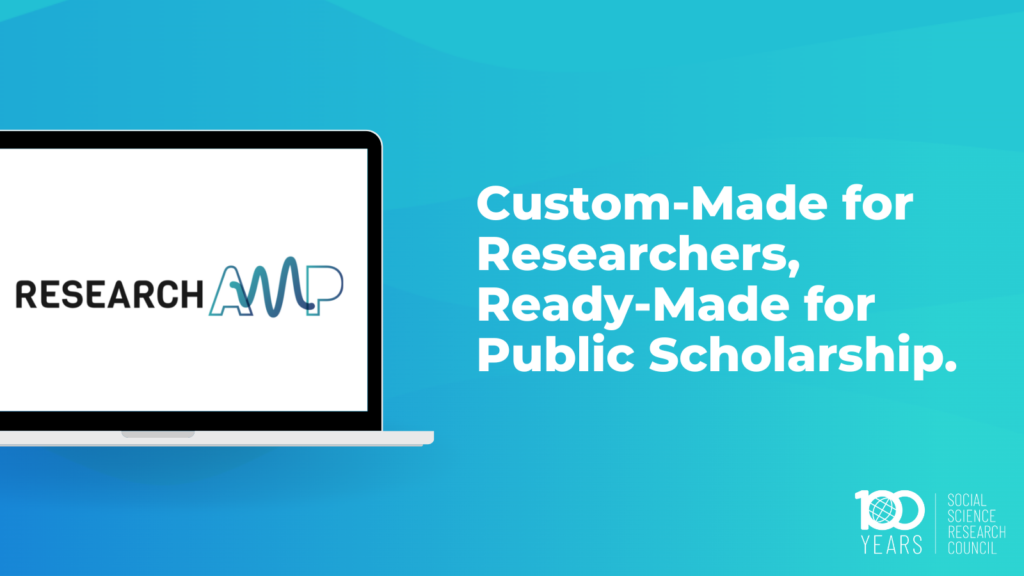
The Social Science Research Council is pleased to announce the public launch of the Research AMP platform, a free, open-source technology for building scholarly communities, collecting research, and sharing insights with new audiences. Research AMP lowers barriers to the dissemination of public scholarship and fills the need to put credible, accessible, and comprehensive scholarship in the hands of expert and lay audiences.
The Research AMP development team will be explaining how scholars, activists, and organizations can use the new platform in a webinar on November 14, 2023, from 2-3 pm. EST.
The online tool—developed in collaboration with Digital Scholar and with the support of the Mellon Foundation—allows users to collate and curate academic literature, news articles, blog posts, podcasts, and other work on a single topic into one place. It allows users to add original content like research reviews and articles, to bring the insights stemming from their collected research to new audiences.
“We are excited about the possibilities of Research AMP for offering scholars a new tool for digital humanities and public outreach projects,” said Molly Laas, co-PI for Research AMP at SSRC. “We’re increasingly seeing resources and information scattered across domains—scholarly journals, blogs, podcasts, archival sites—that might be all important to a project, but there’s no easy way to bring it all together.”
Research AMP is a plugin for the website building platform WordPress, but Research AMP goes beyond a standard WordPress site by integrating Zotero and PressForward, aggregation tools maintained by Digital Scholar.
- Curate scholarly literature about your topic in a public Zotero library, and create new articles and research reviews using that literature
- Collate news articles and reports through PressForward, and present them on your Research AMP site.
- Organize both collated and original content on your Research AMP site. Research topics and tags make it easy to organize this information and make it legible to your audience.
“Scholar-owned platforms are essential especially now as social media continues to fragment. Thanks to the Mellon Foundation’s support, Research AMP is a new tool that enables scholarly communities to share resources and knowledge across disciplines and with the broader public,” said Jason Rhody, co-PI of Research AMP.
More information, and a link to the documentation and technical information about the platform, can be found at https://ramp.ssrc.org/.
SSRC will host an informational webinar about Research AMP on November 14, 2023, from 2 p.m.-3 p.m. EST. If you have questions, or would like to learn more about Research AMP, please register for the webinar.
The Mellon Foundation has supported the technical development of this project, and has helped SSRC fund four research groups to build Research AMP platforms in the past year, at Georgetown University, the University of Illinois-Chicago, Teachers College at Columbia University, and the Cultural Studies Association. These sites will launch in the coming months. Over the past year, the research groups provided feedback on the development of the platform and its documentation, helping SSRC to improve its stability, functionality, and ease of use.
“We would like to thank the Mellon Foundation, as well as the teams at Georgetown, University of Illinois-Chicago, Teachers College at Columbia University, and the Cultural Studies Association for their invaluable work in helping us develop the platform,” Laas added.
About the Mellon Foundation
Established in 1969, the Mellon Foundation seeks to build just communities through grants in arts and culture, higher learning, humanities in place and public knowledge.
About the SSRC
The Social Science Research Council (SSRC) is an independent, international nonprofit with the mission of mobilizing social science for the public good. Founded in 1923, the SSRC fosters research innovation, nurtures new generations of researchers, deepens inquiry within and across disciplines, and catalyzes public knowledge on important public issues. For more information on the SSRC and its programs, please visit www.ssrc.org
About Digital Scholar
Designed by historians, the software and services produced by Digital Scholar—which includes Zotero, Omeka, Tropy, PressForward, and Sourcery—make research, publishing, and cultural heritage work possible.

 Resources
Resources